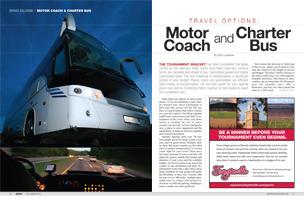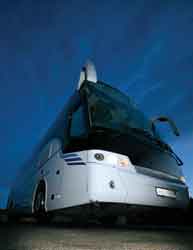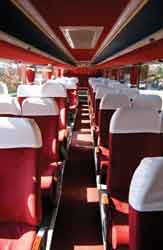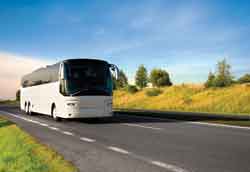
 The tournament bracket has been completed, the dates circled on the calendar, hotel rooms have been reserved, consent forms are complete and ahead of you, memorable games and trophy ceremonies await. The next challenge is transportation, a significant portion of your budget. Planes, trains and automobiles are efficient daily modes of transportation, but the best option for your special event may well be chartering motor coaches or mini buses to reach the competition site.
The tournament bracket has been completed, the dates circled on the calendar, hotel rooms have been reserved, consent forms are complete and ahead of you, memorable games and trophy ceremonies await. The next challenge is transportation, a significant portion of your budget. Planes, trains and automobiles are efficient daily modes of transportation, but the best option for your special event may well be chartering motor coaches or mini buses to reach the competition site.
Team buses are almost as old as team games. If you are planning a team charter, booster tour, travel tournament or park and ride service for the 5K run, there is a good chance that motor coaches are your best option. Travelling together builds team cohesiveness and unity in anticipation of the event. Once your destination is reached, the use of motor coaches can provide in-town transportation, a place to store equipment and the opportunity to disperse itinerary updates and critical information.
Industry statistics show over 750 million people travel by motor coach every year, and for good reason. Multiple studies show that motor coaches are the safest form of surface transportation. Is a motor coach right for your event? There are a few basic elements of your event that will shape the answer, mainly the location and duration of your event and the available budget. Air travel is great to go across the country to one destination and back. If a tournament is less than a day's drive away, many members of your group will prefer the flexibility of their own vehicles. But for trips of over 400 miles, multiple destination tours or venues with security restrictions or difficult parking challenges, motor coaches often preferred.
Next comes the decision of what type of bus to use. Again, you'll need to evaluate this relative to the length of service and budget. The basic vehicle choices in the motor coach class vary with regard to available amenities. Mini-buses or mini-coaches can accommodate 20-30 passengers, but normally won't offer a bathroom, and they are often priced the same as a full coach. Full sized motor-coaches will accommodate 47-56 passengers, and should include a bathroom, air-conditioning and an on-board entertainment system.
 School buses are a less expensive alternative, but are really only good for short distances since in most cases they do not have bathrooms, air conditioning or entertainment systems, and will not ride as comfortably as a modern motor coach.
School buses are a less expensive alternative, but are really only good for short distances since in most cases they do not have bathrooms, air conditioning or entertainment systems, and will not ride as comfortably as a modern motor coach.
The process of choosing a vehicle also includes considering the driver. Professional drivers must adhere to industry Hours of Service regulations, which demand they drive no more than 10 hours straight during any 15-hour shift and they must get at least one eight-hour break between shifts. A plan that includes multiple cities or an extra day of travel may require an additional driver.
There are financial advantages to bus travel. Parking fees will be lower or non-existent. Gas prices affect the carrier, but one motor coach can take the place of up to 55 cars on the highway. If there is sponsorship opportunity involved, motor coach travel offers highly visible branding opportunities.
Are motor coaches a cost-effective option? Consider the case study of a youth basketball team, travelling from Minneapolis to Chicago with games along the way in Milwaukee and Indianapolis. The team members, coaches, parents and chaperones add up to 75 people. Assuming inexpensive air travel is available with $200 round-trip tickets to Chicago. Start with $15,000 in plane fare before we address the side trips and other travel in the Windy City. Train tickets would be less, but add in taxi fares or other public transportation and you're back in the same neighborhood as the airport. Two full-size, modern motor coaches together would cost less than $3,000 per day, including all fuel costs and a room for your driver, with the side trips included.
If your event involves multiple vehicles or cities, consider a transportation management company. These companies can provide enhanced resources resulting in greater flexibility, extended levels of support and lower rates negotiated through massive procurement and contracts with multiple fleet operators.
There are unique challenges to planning travel events to sports destinations, and one is security. Bus travel allows for tighter security measures than individual transportation from boarding through transit and on to the competition venue.
 Team performance can alter an itinerary fast on a tournament trip, and contingency plans may significantly affect your travel plans and ultimately your budget. Keep in touch with the members of your group to insure proper coverage and to avoid overbooking. A professional motor coach operator will route efficiently and should be supported by a dispatcher with access to up-to-the-minute road and weather conditions.
Team performance can alter an itinerary fast on a tournament trip, and contingency plans may significantly affect your travel plans and ultimately your budget. Keep in touch with the members of your group to insure proper coverage and to avoid overbooking. A professional motor coach operator will route efficiently and should be supported by a dispatcher with access to up-to-the-minute road and weather conditions.
Next, locate the right company. Safety becomes the primary focus and fortunately, several organizations are in your corner and have done the heavy lifting already. The U.S. Department of Transportation (www.dot.gov) regulates motor coach operators with strict guidelines and safety requirements. Your motor coach operator should provide their required U.S. DOT number. You can go to the DOT website and research the safety record of your potential coach provider.
The United Motorcoach Association (www.uma.org) and the American Bus Association (www.buses.org) provide additional useful information and planning recommendations. These organizations support initiatives designed to maximize safety and to remove unsafe vehicles and drivers from the roads. If your travel takes you across state lines or across our U.S. border, the operator must have operating authority properly issued by the DOT.
Ask your potential operator several questions. Do they have the required minimum insurance liability coverage of $5 million or more? Their coaches are required to be inspected annually. Do they have inspection and maintenance information available? The drivers must be properly licensed. Do they provide references for the company and the driver? Communication is critical between driver and dispatcher. What systems do they use to remain in contact with the dispatcher as well as local authorities in case of emergency? What are their safety measures and contingency plans? Are replacement vehicles available in a timely manner?
Next comes the contract. Pricing normally includes a minimum price for three or four hours to account for the initial prep and putting the coach into service, with an hourly charge for service extended past the minimum. Some service proposals will demand a full deposit, but it is smart to negotiate a deposit less than the full amount to help insure the best service possible.
 In addition to being efficient, motor coach travel is eco-friendly. Some companies even offer complimentary carbon offset to insure your shuttle service has a negative carbon footprint. There are several other initiatives available as well: BioFuel motor coaches use a combined fuel solution of biodiesel with regular diesel. This program does cost more than using traditional fuel, but the use of bio-diesel results in a substantial reduction of emissions compared to emissions from regular diesel fuel. In most cities, drivers are prohibited from idling engines longer than five or 10 minutes as it wastes fuel and causes pollution. Responsible fleet operators recycle motor oil, antifreeze, tires and batteries. Buses can be washed with biodegradable detergents and the coaches have separate recycling bags on board. Some coach operators use GPS speed monitoring systems to control motor coach speeds, greatly impacting fuel economy.
In addition to being efficient, motor coach travel is eco-friendly. Some companies even offer complimentary carbon offset to insure your shuttle service has a negative carbon footprint. There are several other initiatives available as well: BioFuel motor coaches use a combined fuel solution of biodiesel with regular diesel. This program does cost more than using traditional fuel, but the use of bio-diesel results in a substantial reduction of emissions compared to emissions from regular diesel fuel. In most cities, drivers are prohibited from idling engines longer than five or 10 minutes as it wastes fuel and causes pollution. Responsible fleet operators recycle motor oil, antifreeze, tires and batteries. Buses can be washed with biodegradable detergents and the coaches have separate recycling bags on board. Some coach operators use GPS speed monitoring systems to control motor coach speeds, greatly impacting fuel economy.
Choosing to travel to your sports destination by motor-coach can be an efficient, financially sound, environmentally friendly and just plain fun way to go. Event logistics will dictate your decision. Make a list of your requirements. Vet your potential carrier properly and set agreeable terms for payment.
The uniforms are packed, the equipment bags are loaded, the venue tickets are in hand, cameras are charged and ready. The door is locked (you checked it twice). It's time to get on the bus!

